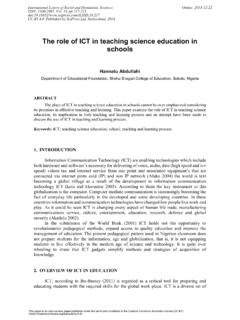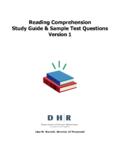Transcription of The Role of Adult Education in National Development
1 The role of Adult Education in National Development Yilben James Jinna1, P. N. Maikano2 1 General Studies Education Department, Federal College of Education , Pankshin, Nigeria 2 Curriculum Department, Federal College of Education , Pankshin, Nigeria ABSTRACT Adult and non-formal Education has been apparently much neglected aspect of educational activities in the country. This neglect could be traced to our colonial heritage where the British colonial masters and the early missionaries who pioneered Education in the African continent paid attention only to formal Education to train clerks and interpreters in Government service and commercial houses; and catechists in the church.
2 The complication and the problem of organizing and administering non-formal Education is yet another reason for the neglect. Keywords: Education ; colonial heritage; missionaries; Africa 1. INTRODUCTION Adult Education in Nigeria is presently geared towards National Development (Ewuzie, 2012). The objective of the process of Adult Education and National Development is to get the adults, either as individuals or as a group, to learn and through learning to change their attitude and behaviour. The policy on Education states the objectives of Adult Education as: 1. To provide functional literacy Education for adults who have never had the opportunity of any formal Education 2.
3 To provide functional and remedial Education for those young people who prematurely dropped out of the formal school system 3. To provide further Education for different categories of completers of formal Education system in order to improve their basic knowledge and skills 4. To provide in-service and on-the-job vocational and professional training for different categories of workers and professionals in order to improve their skills 5. To give the Adult citizens of the country aesthetic, cultural and civic Education for public enlightenment. Monye (1981) opines that all these objectives have one end in view-to equip the Adult with everything he needs for life in order to be relevant to his society by helping to solve some of its problems.
4 We have to recognize that Development is of man, by man and for man. Man is the master of his destiny and Adult Education serves to bring about a fundamental change in man s attitudes and lifestyle. To survive, people must have awareness and to become aware, they must be literate. International Letters of Social and Humanistic SciencesOnline:2014-06-24 ISSN: 2300-2697, Vol. 32, pp 35-42 BY Published by SciPress Ltd, Switzerland, 2014 This paper is an open access paper published under the terms and conditions of the Creative Commons Attribution license (CC BY)( ) 2. Education 2. 1. Adult Education Adult Education usually refers to any form of learning undertaken by or provided for mature men and women outside the formal school system.
5 The main targets are specifically defined as youth (girls and boys over 15 years of age, but sometime younger) as well as women and men, generally poor or socially disadvantaged. Although literacy continues to be at its heart, Adult Education also includes numeracy , problem-solving and life skills, and other knowledge. The notion of Adult Education is often used interchangeably with other notions such as literacy, Adult basic Education , lifelong learning, continuing, Adult basic end non-formal Education , etcetera. For the purpose of this presentation, Adult Education is understood as a transmission process of general, technical or vocational knowledge, as well as skills, values and attitudes, which takes place out of the formal Education system with a view to remedying early Education inadequacies of mature people or equipping them with the knowledge and cultural elements required for their self-fulfilment and active participation in the social, economic and political life of their societies (Seya, 2014).
6 The concept of Development is complex as it has several connotations. However, Allen (2000) has identified three main meanings in which Development is generally used, namely: (i) as a vision, description or measure of the state of being of a desirable society; (ii) as an historical process of social change in which societies are transformed over long periods; and (iii) as consisting of deliberate efforts aimed at improvement on the part of various agencies, including governments, all kinds of organisations and social movements. For the purpose of this presentation, Development will be referred to as a process of economic, social, political and cultural change engineered in a given society by the efforts of all stakeholders, both internal and external including the local communities, the Government, the private sector, the civil society organisations, the NGOs and the technical and financial Development partners- with a view to improving the conditions of the life of the population in a sustainable way.
7 Implicit in these definitions is the assumption that Development requires, interalia, the formation of human capital and social capital, some of the main factors of production required for a broad-based economic growth that provides the ground for sustainable poverty reduction. 2. 2. Adult Education and Development The role of Adult Education in National Development is multi-dimensional. Indeed, as are of the building blocks of human Development , and not just a basic right, Education , including Adult Education , is a foundation for progress in areas such as human capital, health, nutrition and the Development of institutions and democracy.
8 Therefore, the role of Adult Education in Development can be apprehended through the complex relationships existing between all its forms and the economic, political, social and cultural determinant factors of Nigerian Development in particular and Africa as a whole. The economic role of Adult Education in Development is apparent in its contribution to human capital formation. It is now well established that, alongside health care, sanitation, and nutrition that improve people s standard of living and productivity by reducing sickness and mortality rates and by increasing life expectancy, Adult basic Education , by equipping recipients with essential literacy and numeracy skills, yields high rates on investment, thereby enhancing labour productivity.
9 An educated population also provides a more attractive investment climate. Thus, investment in the Development of human capital, through Adult Education , is crucial for developing a labour force and managerial know-how, able to compete in today s global economy (Seya, 2014). 36 ILSHS Volume 32 Formal Education alone is not sufficient for playing this role as even those categories of the population who have had formal Education and training might need to be updated and re-skilled through Adult Education , mainly because today s knowledge society tends to render previously acquired knowledge and skills inappropriate and obsolete.
10 Adult Education is also instrumental in familiarising the active population of Nigeria with Information Communication Technology (ICT), a decisive tool for the smooth integration of Nigerian economies in the global economy. The importance of this cannot be overemphasised as the world is rapidly moving towards knowledge-based economic structures and information societies that comprise networks of individuals, firms, and countries linked electronically in inter-dependent and interactive relationships. Adult Education also plays a major role in social Development . It is now widely admitted that growth will not reduce poverty unless poor people are able to actively participate in it.



